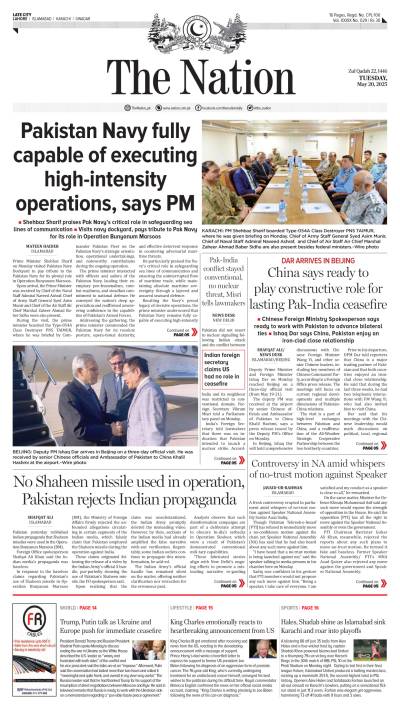A few large dams built in the 20th century for the generation of cheap electricity and even cheaper supply of irrigation water became the subject of public debate as did the proposed Kalabagh Dam on the Indus River. The reasons were not far to seek. With the development of the Indus Basin Project, the government of Pakistan had laid down the rule stating that whichever province helps to set up a power station to produce hydroelectricity on its soil shall be entitled to receive a certain amount of royalty from it. Under this arrangement, the Khyber Pakhtunkhwa (KPK) government has been receiving royalty on Tarbela Dam and are expected to receive the same kind of dole from another dam, Kalabagh, proposed to be built on the Indus.
Many outstanding features of the Kalabagh are located on the soil of KPK, but not the power station. If and when the construction of Kalabagh is undertaken, the site of the dam demands that the power station be installed on the soil of Punjab. The flow of the river leaves no other choice. However, the various governments of KPK consider the project of no use to them if the powerhouse is not placed under their command. Since then, an engineering theory has come to surface declaring Kalabagh unfeasible. It is argued that the embankment perceived would be so high (more than 100 feet from the storage level) that every Monsoon there will be disastrous floods in the agriculturally-rich area of Mardan and Peshawar valley.
Another reason given by the KPK officials to oppose the dam is that the water released from the reservoir will waterlog a large segment of the rich Mardan area. The bottom line of the KPK government’s stand is that its construction will destroy the province’s highly-productive farmland and a large part of the residential units. Punjab is suspected not to stand by the agreements on water sharing.
The objection raised by Sindh is equally unreasonable. Government officials handling the question are highly critical of the dam’s supporters, such as people and politicians of Punjab. It is said that their share of the Indus water will be curtailed, as water from Kalabagh will go to irrigate farmlands in Punjab. It is also pleaded by the Sindh government that coastal regions of the province require a constant flow of water down the Indus into the Arabian Sea, so that the flowing water can keep the seawater from intruding inland. Such seawater intrusion would literally turn the waste areas of Sindh’s coastal land into arid dust. Poor flow from the river to the ocean will also destroy its coastal mangroves.
The ‘No-Dam’ crowd was challenged by the federal government whose engineers argued that since the height of embankment was going to be much higher than the storage level, the claim of anti-dam elements was totally unfounded. The government sources also deemed the KPK allegation about water logging of the rich Mardan land incorrect. The study conducted of the dam-affected area by both national and foreign experts have found no scientific truth in the stand taken by the KPK authorities. Supporting early construction of Kalabagh Dam, Mr Bashir A. Malik, former Chief Technical Advisor to the UN and World Bank, says: “If Kalabagh Dam is not constructed, Sindh and KPK will become drought areas in the years to come.” An equally strong pro-dam statement was made by former Chief Minister of KPK, Shamsul Mulk, stated: “The Kalabagh Dam would be helpful in erasing poverty from KPK, as it will facilitate irrigation of more than 700,000 acres of cultivable land. Currently, this land is lying barren yielding almost nothing.” Additionally, the dam would help generate 3,800 MW of electricity. To protect the main dam infrastructure, all installations would be placed 100 to 150 feet above the level of River Indus. It should be noted that the dam construction experts, who supported Kalabagh, were drawn from all the provinces of Pakistan. Their integrity is beyond question. More names are listed here to enhance credibility. These are Abdul Majid Khan, TECH Society President; Shafqat Masood, former IRSA Chairman; Mansoor Ahmed, former MD of Pakistan Atomic Commission and members of ‘Save Water, Save Pakistan’ forum.
The opponents of the proposed dam are many, but they are shy of basing their case on scientific grounds. It does not take much to feel that they are long on rhetoric and short on rational argument. Consequently, they have to return to politics. The strongest political opposition comes from Sindh where the politicians shamelessly lie to the people, as they recount the vices of non-Sindhi governments. A significant theme of their public speeches is laced with criticism of Punjab. You hear the Punjabis being accused of stealing their share of Indus water. Sindh is a downstream riparian and kind of stuck with the fear that one day the Punjabis will divert the Indus and, thereby, deprive it of every single drop of water and starve the Sindhis to death. The main points of Sindh stand are given below:
n Their share of the Indus water will be curtailed, as water from the Kalabagh will go to irrigate farmlands in Punjab.
n Constant flow of water from the Indus is required to stop any intrusion from the Arabian Sea into Sindh’s coastal area.
n With the construction of Mangla and Tarbela Dams, the mainstream of Indus has significantly shrunk - far less water now moves down the stream than what it used to be.
n Silt deposited in the proposed dam would further curtail the water storage capacity of the Manchar Lake and other lakes fed by the Indus.
n It is not possible to accept the iron clad constitutional guarantee to secure Indus flow. Guarantees were offered by Musharraf.
Raja Pervaiz Ashraf, the last Prime Minister of Pakistan took no stand on the project, and instead of debating the issue at least at the Cabinet level, he abruptly cancelled it by saying that the dam will not be constructed. Apparently, he did it to help his Sindh cronies. He made no secret of his plans. He said that he was doing this because of opposition to the project from Sindh, KPK and other stakeholders. How about Punjab? Is it not a stakeholder? Punjab is currently using more Indus water than any other province. Mr Ashraf broke all the records of cronyism when he declared that Kalabagh Dam is no longer feasible. It is implied in the statement that there have been times when it was feasible. The PM, however, failed to disclose at what point in history was it ever feasible.
Another Prime Minister of the PPP, Yousuf Raza Gilani, a Punjabi, had a different point of view. He did not cancel the project, but instead pleaded for democratic solutions. In a public statement, he declared: “The fate of the project will be determined by a plebiscite.” Gilani’s statement coincided with extreme power crisis and acute water shortage. However, no action was taken by him to hold plebiscite.
International observers of world economy have spoken more than once and at various forums that the next world war is likely to be fought on the sharing of water resources. People can live without many things, but not water. In countries like Pakistan, we can live almost without anything. In fact, with scarcity of water, one has to give up almost every element of human consumption and live in a perpetual state of starvation. But even such a state has limitations and one cannot live forever with the shortage of water. It is a pity that we, in Pakistan, who have been blessed with natural resources, have never given priority to the availability of water. The multitude continue to live without the realisation that the day is not far away when a shower will turn off before an individual has completed his bath. Not much wisdom is required to understand the dependability on water. To meet the needs of our agricultural and human consumption, we must not waste any time to develop our natural resources. If what is flowing down the Indus, and available to the onlooker today, may not be there tomorrow. There is no guarantee that even the bed of the mighty river will not dry up sooner or later if no development is undertaken today. It is worth evaluating Bhasha Dam. This is not the time to seek fun from our misery, as General Musharraf almost advised us to do during his tenure of office. We cannot afford to play with dams or rivers when time itself is running out.
The writer is a freelance columnist.
Tuesday, May 20, 2025
Victim of unethical politics
PM orders swift implementation of FBR reforms, anti-tax evasion measures
3:48 PM | May 20, 2025
EU approves its 17th sanctions package against Russia
3:36 PM | May 20, 2025
Pakistan, India DGMOs agree on gradual troop pullback by May 30
2:59 PM | May 20, 2025
Govt declares public holiday on May 28 to mark Youm-e-Takbeer
2:40 PM | May 20, 2025
Pakistan plans to secure $4.9bn in commercial loans for FY2025-26
2:33 PM | May 20, 2025
-
Lahore emerges among safest global cities in Numbeo 2025 index
-
Lahore emerges among safest global cities in Numbeo 2025 index
-
India’s suspension of Indus Water Treaty legally baseless
-
Seventh polio case reported in Pakistan amid nationwide vaccination drive
-
Pakistan reports sixth polio case of 2025
-
PTA begins issuing VPN licences to regulate usage
The Wider War
May 20, 2025
Margalla on Fire
May 20, 2025
Defeated and Depressed
May 20, 2025
Regional Reset
May 19, 2025
Peak Potential
May 19, 2025
Worse than Anarchy
May 20, 2025
Salute to our Air Force
May 20, 2025
An Unbreakable Wall
May 20, 2025
Profiteering Milk
May 20, 2025
Rewriting the Rules
May 20, 2025
ePaper - Nawaiwaqt
Nawaiwaqt Group | Copyright © 2025





